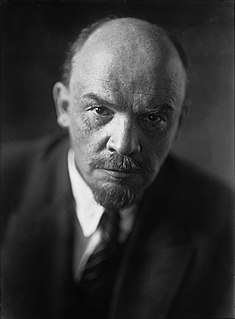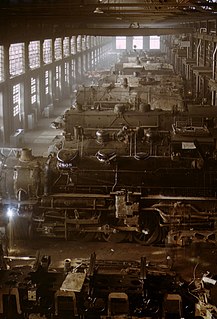Related Research Articles

Leninism is a political ideology developed by Russian Marxist revolutionary Vladimir Lenin that proposes the establishment of the dictatorship of the proletariat led by a revolutionary vanguard party as the political prelude to the establishment of communism. The function of the Leninist vanguard party is to provide the working classes with the political consciousness and revolutionary leadership necessary to depose capitalism in the Russian Empire (1721–1917). Leninist revolutionary leadership is based upon The Communist Manifesto (1848), identifying the communist party as "the most advanced and resolute section of the working class parties of every country; that section which pushes forward all others." As the vanguard party, the Bolsheviks viewed history through the theoretical framework of dialectical materialism, which sanctioned political commitment to the successful overthrow of capitalism, and then to instituting socialism; and, as the revolutionary national government, to realise the socio-economic transition by all means.
A state is a centralized political organization that imposes and enforces rules over a population within a territory. There is no undisputed definition of a state. One widely used definition comes from the German sociologist Max Weber: a "state" is a polity that maintains a monopoly on the legitimate use of violence, although other definitions are not uncommon. A state does not preclude the existence of a society, such as stateless societies like the Haudenosaunee Confederacy that "do not have either purely or even primarily political institutions or roles". The level of governance of a state, government being considered to form the fundamental apparatus of contemporary states, is used to determine whether it has failed.
State capitalism is an economic system in which the state undertakes business and commercial economic activity and where the means of production are nationalized as state-owned enterprises. The definition can also include the state dominance of corporatized government agencies or of public companies such as publicly listed corporations in which the state has controlling shares.

A market economy is an economic system in which the decisions regarding investment, production and distribution to the consumers are guided by the price signals created by the forces of supply and demand, where all suppliers and consumers are unimpeded by price controls or restrictions on contract freedom. The major characteristic of a market economy is the existence of factor markets that play a dominant role in the allocation of capital and the factors of production.
A mixed economy is variously defined as an economic system blending elements of a market economy with elements of a planned economy, markets with state interventionism, or private enterprise with public enterprise. Common to all mixed economies is a combination of free-market principles and principles of socialism. While there is no single definition of a mixed economy, one definition is about a mixture of markets with state interventionism, referring specifically to a capitalist market economy with strong regulatory oversight and extensive interventions into markets. Another is that of active collaboration of capitalist and socialist visions. Yet another definition is apolitical in nature, strictly referring to an economy containing a mixture of private enterprise with public enterprise. Alternatively, a mixed economy can refer to a reformist transitionary phase to a socialist economy that allows a substantial role for private enterprise and contracting within a dominant economic framework of public ownership. This can extend to a Soviet-type planned economy that has been reformed to incorporate a greater role for markets in the allocation of factors of production.

An industrial policy (IP) or industrial strategy of a country is its official strategic effort to encourage the development and growth of all or part of the economy, often focused on all or part of the manufacturing sector. The government takes measures "aimed at improving the competitiveness and capabilities of domestic firms and promoting structural transformation." A country's infrastructure is a major enabler of the wider economy and so often has a key role in IP.

Karl Marx's theory of alienation describes the estrangement of people from aspects of their human nature as a consequence of the division of labor and living in a society of stratified social classes. The alienation from the self is a consequence of being a mechanistic part of a social class, the condition of which estranges a person from their humanity.

In sociology, industrial society is a society driven by the use of technology and machinery to enable mass production, supporting a large population with a high capacity for division of labour. Such a structure developed in the Western world in the period of time following the Industrial Revolution, and replaced the agrarian societies of the pre-modern, pre-industrial age. Industrial societies are generally mass societies, and may be succeeded by an information society. They are often contrasted with traditional societies.

Political sociology is an interdisciplinary field of study concerned with exploring how governance and society interact and influence one another at the micro to macro levels of analysis. Interested in the social causes and consequences of how power is distributed and changes throughout and amongst societies, political sociology's focus ranges across individual families to the State as sites of social and political conflict and power contestation.

State ownership, also called government ownership and public ownership, is the ownership of an industry, asset, or enterprise by the state or a public body representing a community, as opposed to an individual or private party. Public ownership specifically refers to industries selling goods and services to consumers and differs from public goods and government services financed out of a government's general budget. Public ownership can take place at the national, regional, local, or municipal levels of government; or can refer to non-governmental public ownership vested in autonomous public enterprises. Public ownership is one of the three major forms of property ownership, differentiated from private, collective/cooperative, and common ownership.

Georg Friedrich List was a German-American economist who developed the "National System" of political economy. He was a forefather of the German historical school of economics, and argued for the German Customs Union from a Nationalist standpoint. He advocated imposing tariffs on imported goods while supporting free trade of domestic goods, and stated the cost of a tariff should be seen as an investment in a nation's future productivity.
A theory of capitalism describes the essential features of capitalism and how it functions. The history of various such theories is the subject of this article.

The theory of state monopoly capitalism was initially a Marxist thesis popularised after World War II. Lenin had claimed in 1916 that World War I had transformed laissez-faire capitalism into monopoly capitalism, but he did not publish any extensive theory about the topic. The term refers to an environment where the state intervenes in the economy to protect larger monopolistic or oligopolistic businesses from threats. As conceived by Lenin in his pamphlet of the same name the theory aims to describe the final historical stage of capitalism, of which he believed the Imperialism of that time to be the highest expression.

The ideology of the Communist Party of the Soviet Union (CPSU) was Marxism–Leninism, an ideology of a centralised command economy with a vanguardist one-party state to realise the dictatorship of the proletariat. The Soviet Union's ideological commitment to achieving communism included the development of socialism in one country and peaceful coexistence with capitalist countries while engaging in anti-imperialism to defend the international proletariat, combat capitalism and promote the goals of communism. The state ideology of the Soviet Union—and thus Marxism–Leninism—derived and developed from the theories, policies and political praxis of Lenin and Stalin.

The 1965 Soviet economic reform, sometimes called the Kosygin reform or Liberman reform, was a set of planned changes in the economy of the USSR. A centerpiece of these changes was the introduction of profitability and sales as the two key indicators of enterprise success. Some of an enterprise's profits would go to three funds, used to reward workers and expand operations; most would go to the central budget.
Corporatism is a collectivist political ideology which advocates the organization of society by corporate groups, such as agricultural, labour, military, business, scientific, or guild associations, on the basis of their common interests. The term is derived from the Latin corpus, or "body".
State socialism is a political and economic ideology theorised by Ferdinand Lassalle within the socialist movement that is against private ownership and advocates state ownership of the means of production, either as a temporary measure or as a characteristic of socialism in the transition from the capitalist to the socialist mode of production or communist society. It refers to the theory, doctrine and movement that advocates a planned economy controlled by the state in which all industries and natural resources are state-owned.

The socialist mode of production, sometimes referred to as the communist mode of production, or simply (Marxian) socialism or communism as Karl Marx and Friedrich Engels used the terms communism and socialism interchangeably, is a specific historical phase of economic development and its corresponding set of social relations that emerge from capitalism in the schema of historical materialism within Marxist theory. The Marxist definition of socialism is that of production for use-value, therefore the law of value no longer directs economic activity. Marxist production for use is coordinated through conscious economic planning. According to Marx, distribution of products is based on the principle of "to each according to his needs", however soviet models have often distributed products based on the principle of "to each according to his contribution". The social relations of socialism are characterized by the proletariat effectively controlling the means of production, either through cooperative enterprises or by public ownership or private artisanal tools and self-management. Surplus value goes to the working class and hence society as a whole.

In Marxist philosophy, the dictatorship of the proletariat is a condition in which the proletariat holds state power. The dictatorship of the proletariat is the intermediate stage between a capitalist economy and a communist economy, whereby the post-revolutionary state seizes the means of production, compels the implementation of direct elections on behalf of and within the confines of the ruling proletarian state party, and instituting elected delegates into representative workers' councils that nationalise ownership of the means of production from private to collective ownership. During this phase, the administrative organizational structure of the party is to be largely determined by the need for it to govern firmly and wield state power to prevent counterrevolution and to facilitate the transition to a lasting communist society. Other terms commonly used to describe the dictatorship of the proletariat include socialist state, proletarian state, democratic proletarian state, revolutionary dictatorship of the proletariat and democratic dictatorship of the proletariat.
A socialist state, socialist republic, or socialist country, sometimes referred to as a workers' state or workers' republic, is a sovereign state constitutionally dedicated to the establishment of socialism. The term communist state is often used synonymously in the West specifically when referring to one-party socialist states governed by Marxist–Leninist Communist parties, despite these countries being officially socialist states in the process of building socialism. These countries never describe themselves as communist nor as having implemented a communist society. Additionally, a number of countries that are multi-party capitalist states make references to socialism in their constitutions, in most cases alluding to the building of a socialist society, naming socialism, claiming to be a socialist state, or including the term people's republic or socialist republic in their country's full name, although this does not necessarily reflect the structure and development paths of these countries' political and economic systems. Currently, these countries include Algeria, Bangladesh, Guyana, India, Nepal, Nicaragua, Sri Lanka and Tanzania.
References
This article incorporates material from the Citizendium article "Commercial state", which is licensed under the Creative Commons Attribution-ShareAlike 3.0 Unported License but not under the GFDL.